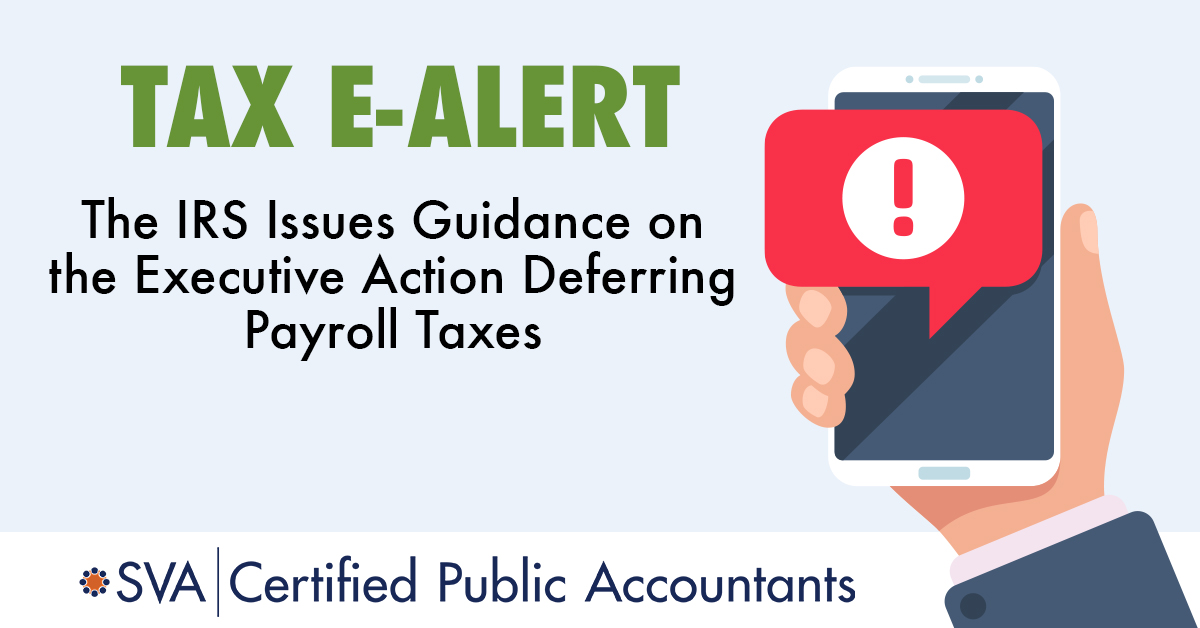

On August 28, the IRS issued guidance that provides some explanation of how employers can defer withholding and remitting an employee’s share of Social Security tax when wages are below a certain amount. The guidance in Notice 2020-65 was issued to implement President Trump’s executive action signed in early August.
The guidance is brief, and private employers still have questions about whether, and how, to implement the deferral. The President’s action only defers Social Security taxes; it doesn’t forgive them, meaning employees will have to pay the taxes later unless Congress passes a law to eliminate the liability.
On August 8, President Trump signed a Presidential Memorandum that permits the deferral of the employee portion of Social Security taxes for certain employees due to the COVID-19 pandemic.
The memorandum directed Treasury Secretary Steven Mnuchin to defer withholding, deposit and payment of an eligible employee’s share of Social Security taxes (or the employee’s share of Railroad Retirement taxes) on wages or compensation paid from September 1, 2020, through December 31, 2020. It applies to employees whose wages or compensation, payable during any biweekly pay period, generally are less than $4,000, or the equivalent amount with respect to other pay periods. Amounts can be deferred without penalties, interest or additions to the tax.
Note:Under the CARES Act, employers can already defer paying their portion of Social Security taxes through December 31, 2020. All 2020 deferred amounts are due in two equal installments — one at the end of 2021 and the other at the end of 2022.
Issued on August 28, the three-page guidance postpones the withholding and remittance of the employee share of Social Security tax until the period beginning on January 1, 2021, and ending on April 30, 2021. Penalties, interest and additions to tax will begin to accrue on May 1, 2021, for any unpaid taxes.
The guidance states that “if necessary,” the employer “may make arrangements to collect the total applicable taxes” from an employee. This appears to answer one question that employers have about what happens if an employee leaves a job later this year or before the deferred taxes are due. However, no additional details are given on how an employer should make arrangements to collect unpaid tax.
Before the guidance was issued, several business and payroll groups stated that their members would not implement the deferral. The U.S. Chamber of Commerce and more than 30 trade associations sent a letter to members of Congress and the U.S. Department of the Treasury calling the deferral unworkable.
“If this were a suspension of the payroll tax so that employees were not forced to pay it back later, implementation would be less challenging,” the letter states. “But under a simple deferral, employees would be stuck with a large tax bill in 2021. Many of our members consider it unfair to employees to make a decision that would force a big tax bill on them next year… Therefore, many of our members will likely decline to implement deferral, choosing instead to continue to withhold and remit to the government the payroll taxes required by law.”
The National Payroll Reporting Consortium, a payroll services industry association, stated there are “substantial” computer programming changes that are needed to implement the deferral.
“Payroll systems are designed to apply a single Social Security tax rate for the full year, and to all employees equally,” the consortium explained. “Applying a different tax rate for part of the year, beginning in the middle of a quarter, and applying such a change to some employers but not others, and to some employees but not others, is quite complex. Not all employers and payroll systems will be able to make these complex changes by September 1.”
There are still unanswered questions about the payroll tax deferral. If you need assistance or have questions about how to proceed at your business, contact us. We can help you decide whether to participate and how to go forward.
© 2020Services
Madison, WI
1221 John Q Hammons Dr, Suite 100
Madison, WI 53717
(608) 831-8181
Milwaukee, WI
18650 W. Corporate Drive, Suite 200
Brookfield, WI 53045
(262) 641-6888
Colorado Springs, CO
10855 Hidden Pool Heights, Suite 340
Colorado Springs, CO 80908
(719) 413-5551

Are you in the know on the latest business trends, tips, strategies, and tax implications? SVA’s Biz Tips are quick reads on timely information sent to you as soon as they are published.
Copyright © 2026 SVA Certified Public Accountants | Privacy Policy | Cookie Policy | CCPA